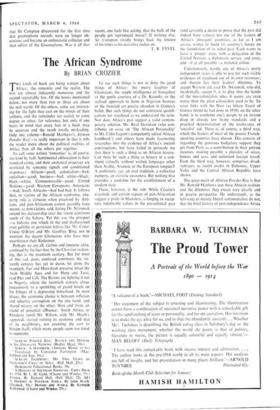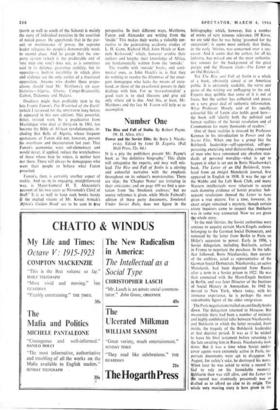The African Syndrome
By BRIAN CROZIER
Two kinds of book are being written about I Africa : the romantic and the realist. The first are almost indecently numerous and the second regrettably few. Of the books mentioned below, not more than two or three are about the real world. Of the others, some are interest- ing for the light they cast on the minds of their authors, and the remainder are useful, to some degree or other, for reference, but only if one bears in mind that every fact in a book may be accurate and the result totally misleading. Only one volume—Ronald Matthews's African Powder Kee—is really important in that it tells the reader more about the political realities of Africa than all the others put together.
To call some writers 'romantics' is, of course, too kind by half. Sentimental obfuscation is their standard crime, and their analytical processes are restricted by semantic signals and conditioned responses: African—good; colonialism—bad; socialism—good; business—bad; white—black; black—white; Commonwealth—good; United Nations—good; Western Europeans, Americans —bad; South Africans—bad bad bad. It follows that, to victims of the African syndrome, one- party rule is virtuous when practised by Afri- cans, and pan-Africanism cannot possibly have meant, as non-victims said, letting Dr. Nkrumah extend his dictatorship over the whole continent south of the Sahara. Yet this was the prospect —a hideous one which in the end disillusioned even gullible or persistent leftists like Mr. Conor Cruise O'Brien and Mr. Geoffrey Bing. not to mention the decent Ghanaians who have now overthrown their Redeemer.
Perhaps we are all, victims and immune alike, confused by the fact that, by the Christian reckon- ing, this is the twentieth century. But for most of this sad, poor, confused continent, the six- teenth century has yet to dawn, let alone the twentieth. Fez and Marrakesh preserve intact the Arab Middle Ages and for Hutu and Tutsi, read Pict and Celt. The Barons are fighting it out in Nigeria, where the twentieth century clings precariously to a sprinkling of grand hotels on the fringes of a depressing hinterland. In most places, the economic choice is between inflation and selective corruption on the one hand, and shared misery on the other. Here and there, an island of potential affluence: South Africa, or Rhodesia (until Mr. Wilson, with Mr. Heath's approval, started ruining its economy and that of its neighbours, not counting the cost to Britain itself, which many people seem too timid to mention).
AFRICAN POWDER KEG: REVOLT AND DISSENT
IN SIX EMERGENT NATIONS. (Bodley Head. 30s.) AFRICA: A HANDBOOK. (Anthony Blond. 16 6s.) Translated by Constance Farrington. (Mac-
Gibbon and Kee, 36s.)
4 AFRICAN TIGHTROPE: MY Two YEARS AS NKRUMAH'S CHIEF OF STAFF. (Pall Mall. 25s.) Heinemann Educational Books, 30s.
A HISTORY OF SOUTHERN RHODESIA: EARLY DAYS
To 1934. By L. H. Gann. (Chatto and Windus, 55s.) ZAMBIA. By Richard Hall. (Pall Mall. 52s. 6d.) A HISTORY OF POSTWAR AFRICA. By John Hatch. (Deutsch. 50s.) BRITAIN AND Al RICA. By Kenneth K1rkwood. (Chatto and Wiadus, 25s.) To say such things is not to deny the good things of Africa : the merry laughter of Ghanaians, the supple intelligence of Senegalese or the gentle courtesy of a Dr. Kaunda; or the stylised approach to form in Nigerian bronzes or the frenzied yet precise abandon in Guinea's ballet. But such things do not constitute qualifi- cations for statehood as we understand the term. Nor does Africa's past suggest a valid contem- porary solution. Mr. Basil Davidson (who con- tributes an essay on 'The African Personality' to Mr. Colin Legum's competently edited African handbook') and others have made fascinating researches into the evidence of Africa's ancient constructions, but have failed to persuade me that there is such a thing as an African history. Can there be such a thing as history in a con- tinent virtually without written languages other than Arabic, Aramaic or the European tongues? A prehistory, yes, an oral tradition, a collective memory, an atavistic awareness. But nothing that provides a guideline for the establishment of a modern state.
There, however, is the rub. While Cesaire's tztlgritude and certain aspects of pan-Africanism suggest a pride in blackness, a longing to recap- ture indefinable values in the pre-colonial past (and certainly a desire to prove that the past did indeed have values), not one of the leaders of Africa's 'emergent' countries, as far as I am aware, wishes to build his country's future on the foundation of its tribal past. Each wants to have a 'proper' state, with a delegation at the United Nations, a diplomatic service, and army, and--if at all possible—a national airline.
Unfortunately, hardly any of Africa's newly independent states is able to ply for such visible evidences of statehood out of its own resources; and therein lies their leaders' dilemma. To accept Western aid, said Dr. Nkrumah, who did, incidentally, accept P., is to play into the hands of the neo-colonialists who, it seems, are even worse than the plain colonialists used to be. To sever links with the West (as Sdkou Tourd of Guinea found he had done in 1958), on the other hand, is to condemn one's people to an instant drop in already low living standards and a practical demonstration of the irrelevance of 'socialist' aid. There is, of course, a third way, which the leaders of most of the poorer French- speaking countries have chosen. This consists of regarding the generous budgetary support they get from Paris as a contribution to their private incomes, making possible a plurality of wives, houses and cars, and unlimited foreign travel. Even the third way, however, comprises disad- vantages, as recent events in Dahomey, Upper Volta and the Central African Republic have shown.
The great merit of African Powder Keg is that Mr. Ronald Matthews sees these African realities and the dilemmas they create very clearly and in precise perspective. He understands, as the left-wing or merely liberal sentimentalists do not, that the brief history of post-independence Africa (north as well as south of the Sahara) is mainly the story of individual exercises in the assertion of naked power. He apprehends that in the pur- suit or maintenance of power, the supreme leader relegates his people's demonstrable needs to second place. And he grasps that the one- party system (which is the predictable end of 'one man one vote') does not, as is sometimes said in its defence, guarantee stability, but its opposite—a built-in instability in which plots and violence are the only outlets of a frustrated opposition. Anyone who doubts these propo- sitions should read Mr. Matthews's six case- histories—Algeria, Ghana, Congo-Brazzaville, Gabon, Dahomey and Malawi.
Doubters might then profitably turn to the late Frantz Fanon's The Wretched of the Earth' (which I reviewed for the SPECTATOR long before it appeared in this new edition). This powerful, bitter, twisted work by a psychiatrist from Martinique who died at thirty-six in 1961, has become the Bible of African revolutionaries, in- cluding Ben Bella of Algeria, whose frequent quotations of Fanon did not, however, prevent his overthrow and incarceration last year. That Fanon's economics were sub-elementary and would never, if applied, reduce the wretchedness of those whose hate he voices, is neither here nor there. There will always be demagogues who want their people to believe what Fanon preached.
Fanon's, then, is certainly another aspect of reality. And so, in its engaging, straightforward way, is Major-General H. T. Alexander's account of his two years as Nkrumah's Chief of Staff.' It is as well to keep such books handy if the exalted visions of Mr. Kwesi Armah's 'Africa's Golden Roads are to be seen in true
perspective. In their different ways, Matthews, Fanon and Alexander are writing from the 'inside.' This makes their works, a valuable cor- rective to the painstaking academic studies of L. H. Gann, Richard Hall, John Hatch or Ken- neth Kirkwood,' which, however erudite their authors and lengthy their knowledge of Africa, are fundamentally written from the 'outside.'
The trouble with 'outside' books, and senti- mental ones, as John Hatch's is, is that they do nothing to resolve the dilemmas of the emer- gent demagogue who lacks the means of state- hood, or those of the ex-colonial powers in their dealings with him. For us 'neo-colonialists' a good start is to shed illusions and give aid only where aid is due. And this, at least, Mr. Matthews and the late M. Fanon will help us to accomplish.



































 Previous page
Previous page